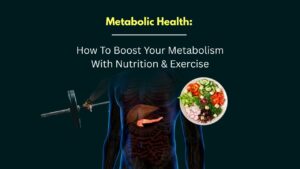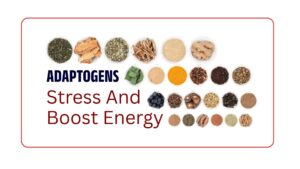
Vaishali
Bariatric Dietician & Content Writer

Metabolic Health: How To Boost Your Metabolism With Nutrition & Exercise

Metabolism refers to the complex series of processes your body uses to convert food into energy. It affects everything from your ability to burn calories to how efficiently your body uses energy. A healthy metabolism is crucial for overall well-being and plays a key role in maintaining a healthy weight, boosting energy levels, and improving mood. If you feel like your metabolism is sluggish, there are ways to naturally rev it up—primarily through the right combination of nutrition and exercise. Let’s dive into how you can boost your metabolism with simple lifestyle changes.
What Is Metabolism?
Metabolism is the process through which your body converts the food and drinks you consume into energy. It involves a variety of complex chemical reactions in cells, which provide the energy your body needs to perform essential functions like breathing, digesting food, and keeping your organs working. Your Basal Metabolic Rate (BMR) refers to the number of calories your body burns at rest to maintain these functions. Factors such as age, gender, muscle mass, and genetics can influence your metabolic rate.
How Nutrition Affects Metabolism
What you eat plays a major role in determining how efficiently your body burns calories. The right foods can help increase metabolism, while others can slow it down. Here are some nutritional strategies to help boost your metabolism:
1. Eat Protein-Rich Foods
Including more protein in your diet can help speed up your metabolism due to the thermic effect of food (TEF). TEF refers to the energy required to digest, absorb, and process nutrients, and protein has the highest TEF of all macronutrients. When you eat protein-rich foods like lean meats, fish, eggs, legumes, and dairy, your body burns more calories during digestion compared to fats and carbohydrates.
2. Stay Hydrated
Drinking plenty of water is crucial for maintaining an efficient metabolism. Studies have shown that drinking water can temporarily increase metabolic rate by up to 30% for about 30-40 minutes. Cold water, in particular, can have a slight advantage as your body uses energy to warm the water to body temperature. Additionally, drinking water before meals can help with appetite control and prevent overeating.
3. Don’t Skip Meals
Skipping meals can slow down your metabolism as your body may enter “starvation mode,” lowering its metabolic rate to conserve energy. Eating regular, balanced meals helps to keep your metabolism functioning efficiently. Try eating smaller meals throughout the day to keep your energy levels stable and prevent overeating.
4. Include Metabolism-Boosting Foods
Some foods and drinks have natural metabolism-boosting effects. Green tea and coffee are two examples. Both contain caffeine and other compounds that can temporarily raise your metabolic rate. Additionally, foods like chili peppers and ginger contain capsaicin, a compound that can slightly increase metabolism by raising your body’s temperature.
How Exercise Affects Metabolism
Exercise is one of the most effective ways to increase metabolism, not only during the workout but also long after it. Here’s how different types of exercise can help boost your metabolism:
1. Strength Training
Building muscle mass is one of the best ways to boost your metabolism. Muscle tissue burns more calories at rest than fat tissue, meaning that the more muscle you have, the higher your resting metabolic rate. Incorporating strength training exercises such as weightlifting, resistance band exercises, or bodyweight exercises into your routine can increase muscle mass and help elevate your metabolism over time.
2. High-Intensity Interval Training (HIIT)
HIIT involves short bursts of intense exercise followed by brief periods of rest or low-intensity activity. Research has shown that HIIT can significantly increase metabolism and fat burning, even after the workout is over. This phenomenon is known as the afterburn effect or excess post-exercise oxygen consumption (EPOC), where your body continues to burn calories at an elevated rate for hours after the workout.
3. Cardiovascular Exercise
While strength training builds muscle, cardiovascular exercises like running, cycling, and swimming can increase your heart rate and help you burn calories. Cardiovascular exercise improves overall fitness and can help with fat loss, which indirectly supports a more efficient metabolism. Additionally, regular cardio can help improve insulin sensitivity, further supporting metabolic health.
Other Tips to Boost Metabolism
Aside from nutrition and exercise, there are a few other strategies to consider for improving metabolic health:
Get Enough Sleep: Lack of sleep can impair metabolic function and lead to weight gain. Aim for 7-9 hours of quality sleep per night to keep your metabolism functioning optimally.
Manage Stress: Chronic stress can elevate cortisol levels, which can negatively impact metabolism and lead to weight gain, especially around the belly. Practice relaxation techniques like meditation, deep breathing, or yoga to reduce stress.
Stay Active Throughout the Day: In addition to regular exercise, try to move more throughout the day. Simple activities like walking, taking the stairs, or standing rather than sitting can help boost your daily calorie burn.
Conclusion -
Boosting your metabolism isn’t about relying on quick fixes or fad diets. It’s about making sustainable changes to your nutrition and exercise habits. By eating a balanced diet rich in protein, staying hydrated, and incorporating strength training and cardio into your routine, you can support a healthy metabolism and enjoy the long-term benefits of increased energy, better weight management, and overall improved health. Remember, small, consistent changes can lead to significant improvements in your metabolic health, so start today and make your metabolism work for you!







